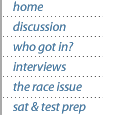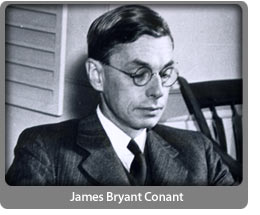 | 
During the First World War, Robert Yerkes, a leading member of the new IQ
testing movement, persuaded the U.S. Army to let him test all recruits for
intelligence. This test--the Army Alpha--was the first mass
administered IQ test. One of Yerkes' assistants was a young psycholoist named
Carl Brigham, who taught at Princeton.
After the war, Brigham began adapting the Army Alpha (mainly by making it more
difficult) for use as a college admissions test. It was first
administered experimentally to a few thousand college applicants in 1926.
 In 1933, James Bryant Conant, on becoming president of Harvard,
decided to start a new scholarship program for academically gifted boys who did
not come from the Eastern boarding schools that were the regular suppliers of
Harvard's students. He gave Henry Chauncey, an assistant dean at Harvard, the
task of finding a test to evaluate candidates for these scholarships. Chauncey
met Carl Brigham, and came back to Conant with the recommendation that he use
the SAT. Conant liked the test because he thought it measured pure
intelligence, regardless of the quality of the taker's high school
education. In 1933, James Bryant Conant, on becoming president of Harvard,
decided to start a new scholarship program for academically gifted boys who did
not come from the Eastern boarding schools that were the regular suppliers of
Harvard's students. He gave Henry Chauncey, an assistant dean at Harvard, the
task of finding a test to evaluate candidates for these scholarships. Chauncey
met Carl Brigham, and came back to Conant with the recommendation that he use
the SAT. Conant liked the test because he thought it measured pure
intelligence, regardless of the quality of the taker's high school
education.
In 1938 Chauncey talked all the member schools of the College Board
into using the SAT as a uniform exam, but only for scholarship applicants. In
1942, because of the war, all the pre-existing College Board admissions
tests were abolished, so the SAT became te test for all applicants. In
1944, under contract to the Army and the Navy, Chauncey administered the SAT to
more than 300,000 people all over the country on a single day. In 1948 the
Educational Testing Service was chartered and the SAT was on its way to
becoming the basic college admissions device for millions.
The test has changed over the years, but not completely. The web site
http://www.the-big-test.com/ has sample questions from the original SAT, and
from the contemporary SAT, with instant scoring, if you'd like to try your hand
at both.

home |
discussion |
who got in? |
interviews |
the race issue |
sat & test prep |
history of the sat
the screening process |
test score gap |
getting in to berkeley |
bibliography |
links |
tapes & transcripts |
press |
synopsis
FRONTLINE |
pbs online |
wgbh
 |  |